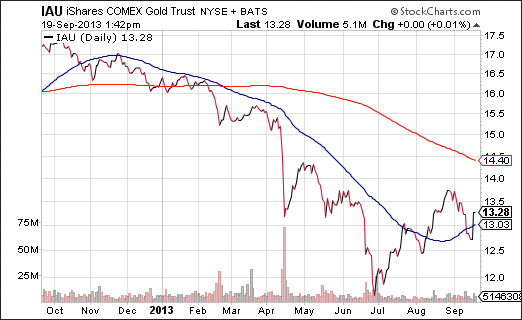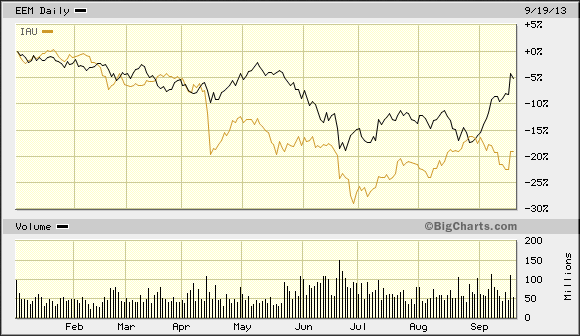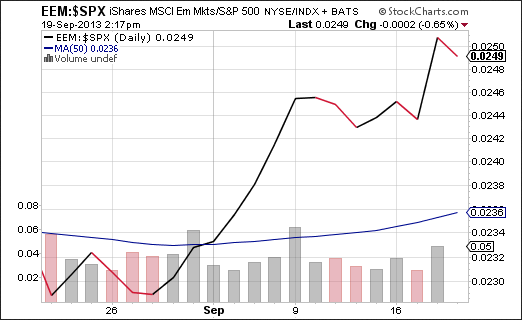Many commentators at some of the more popular web portals and news agencies have suggested that the surprise “non-taper” by the Fed is causing gold to surge. Granted, money poured into precious metals as soon as Wall Street got wind of the Fed’s choice; that is, they’re still going to buy $85 billion in bonds every month to depress longer-term interest rates. Yet the fact remains, the correlation between gold and ultra-accommodating monetary policy has been exceptionally weak for quite some time. (See my August 2013 feature, Is Gold Just Another Metals ETF?)
By way of review, the Fed doubled its bond-buying experiment last September. Theoretically, record levels of electronic money printing should have devalued the dollar and pushed currency proxies like gold through the proverbial roof. However, SPDR Gold Trust (GLD), iShares Gold (IAU), ETFs Gold Trust (SGOL) and the spot price of the yellow metal hardly skyrocketed over the last 12 months.
As I suggested in my August piece, precious metals have been tied more to the fortunes or, misfortunes, of key emerging markets. When you focus on the direction of several benchmark ETFs, you see a strong positive correlation between iShares Gold (IAU) and iShares Emerging Markets (EEM), particularly in 2013. It is worth noting that both IAU and EEM bounced off respective June lows at nearly the same moment in time. It’s also worth noting, in fact, that there has been an unusually strong correlation for roughly two years.
It follows that one reason for gold’s “comeback” is the increasing interest in emerging markets over the last three months. Over the last 30 days, money flowing back into emerging market ETFs has given funds like EEM the upper hand in relative strength.
Still, there is a far more potent reason for gold to make a short-term run than the emerging market connection. The debt ceiling debacle of 2011 went a long way toward creating a stock-market correction that year; euro-zone woes then exacerbated fears of stock ownership. Indeed, the May-October swoon rocked U.S. stocks, as the Dow Industrials logged a high-to-low closing decline of approximately -19.9%, Meanwhile, gold futures gained 25%+ over the same time frame.
Gold, then, may or may not reclaim a throne as a currency proxy. On the flip side, it is maintaining its association with the emerging market growth (or lack thereof) story. And, more notably, it is keeping its place as a shelter from severe political storms.
If the U.S. budget debate and debt ceiling negotiations result in a lengthy shutdown of the U.S. government, if the rhetoric heats up to a boiling point where resolution appears elusive, funds like iShares Gold (GLD), PowerShares DB Precious Metals (DBP) and iShares Silver Trust (SLV) will benefit. If a deal is struck in much the same way that the fiscal cliff was resolved, stocks may not suffer much in the way of a pullback and precious metal performance will likely rely on data coming out of emerging economies.
- English (UK)
- English (India)
- English (Canada)
- English (Australia)
- English (South Africa)
- English (Philippines)
- English (Nigeria)
- Deutsch
- Español (España)
- Español (México)
- Français
- Italiano
- Nederlands
- Português (Portugal)
- Polski
- Português (Brasil)
- Русский
- Türkçe
- العربية
- Ελληνικά
- Svenska
- Suomi
- עברית
- 日本語
- 한국어
- 简体中文
- 繁體中文
- Bahasa Indonesia
- Bahasa Melayu
- ไทย
- Tiếng Việt
- हिंदी
Here's Why Precious-Metals ETFs Are Surging
Published 09/19/2013, 02:59 PM
Updated 07/09/2023, 06:31 AM
Here's Why Precious-Metals ETFs Are Surging
Latest comments
Loading next article…
Install Our App
Risk Disclosure: Trading in financial instruments and/or cryptocurrencies involves high risks including the risk of losing some, or all, of your investment amount, and may not be suitable for all investors. Prices of cryptocurrencies are extremely volatile and may be affected by external factors such as financial, regulatory or political events. Trading on margin increases the financial risks.
Before deciding to trade in financial instrument or cryptocurrencies you should be fully informed of the risks and costs associated with trading the financial markets, carefully consider your investment objectives, level of experience, and risk appetite, and seek professional advice where needed.
Fusion Media would like to remind you that the data contained in this website is not necessarily real-time nor accurate. The data and prices on the website are not necessarily provided by any market or exchange, but may be provided by market makers, and so prices may not be accurate and may differ from the actual price at any given market, meaning prices are indicative and not appropriate for trading purposes. Fusion Media and any provider of the data contained in this website will not accept liability for any loss or damage as a result of your trading, or your reliance on the information contained within this website.
It is prohibited to use, store, reproduce, display, modify, transmit or distribute the data contained in this website without the explicit prior written permission of Fusion Media and/or the data provider. All intellectual property rights are reserved by the providers and/or the exchange providing the data contained in this website.
Fusion Media may be compensated by the advertisers that appear on the website, based on your interaction with the advertisements or advertisers.
Before deciding to trade in financial instrument or cryptocurrencies you should be fully informed of the risks and costs associated with trading the financial markets, carefully consider your investment objectives, level of experience, and risk appetite, and seek professional advice where needed.
Fusion Media would like to remind you that the data contained in this website is not necessarily real-time nor accurate. The data and prices on the website are not necessarily provided by any market or exchange, but may be provided by market makers, and so prices may not be accurate and may differ from the actual price at any given market, meaning prices are indicative and not appropriate for trading purposes. Fusion Media and any provider of the data contained in this website will not accept liability for any loss or damage as a result of your trading, or your reliance on the information contained within this website.
It is prohibited to use, store, reproduce, display, modify, transmit or distribute the data contained in this website without the explicit prior written permission of Fusion Media and/or the data provider. All intellectual property rights are reserved by the providers and/or the exchange providing the data contained in this website.
Fusion Media may be compensated by the advertisers that appear on the website, based on your interaction with the advertisements or advertisers.
© 2007-2025 - Fusion Media Limited. All Rights Reserved.
